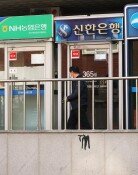Political Con-Artist Indicted on Fraud Charges
Political Con-Artist Indicted on Fraud Charges
Posted April. 24, 2008 05:04,
The Seoul Central Prosecutors` Office reportedly asked the court for a habeas corpus warrant yesterday for Kim Dae-up in relation to his involvement in a fraud case. Kim allegedly concocted a story during the 2002 presidential election, which dealt a fatal blow to the Grand National Partys presidential candidate but helped Roh Moo-hyun, who eventually became president.
According to authorities, a woman, only known by her last name Park, asked Kim in February 2005 to find a plot of land that would return a high yield. Kim arranged a real estate deal and swindled her out of 270 million won (approximately $270,000) by inflating the price.
Kim reportedly told her that the land was to be developed as a resort town, and helped her settle the contract and record the title. Park handed over 380 million won, but Kim actually paid only 110 million for the land.
Only later did she discover that the deal was fraudulent. Park filed a criminal claim last year with the police, which had investigated the case since April and transferred the case to the prosecution this January.
Unable to secure Kims whereabouts, the prosecution put him on the fugitives list and the court issued a bench of warrant, authorizing his arrest. Kim was apprehended by authorities in Seoul on Monday.
The Seoul District Court will convene his arraignment hearing Thursday at 10:30 a.m.
A prosecutor close to the case confirmed on the condition of anonymity, We are still working on Kims case. We will check whether he violated other laws. As such, the prosecution might reopen Kims allegations in 2002 to see whether or not any member of the then ruling party was involved in Kims false claims at that time.
Earlier in January, Kim sent a long e-mail to a TV station producer, arguing that he wanted to settle an old score with the former governments key staff members, who basked in the pleasures of power. Kim said he did not mind whether the venue took the form of a press conference or an interview.
Most experts predict that what Kim says during the interrogation may trigger a probe into those behind the 2002 allegations.
If any political figure has promised some monetary or other compensation for Kims allegations, prosecutors can investigate the person as Kims accomplice.
The statute of limitations for defamation and false accusation expires in five years and seven years, respectively. But the time begins from the indictment of one of the accomplices to final determination by the high court on the sentencing of the accomplice.
Kim was indicted in February 2003, but the guilty verdict and penalty were finally upheld by the Supreme Court in February 2004. As such, Kim was sentenced to 22 months on a suspended sentence.
needjung@donga.com



![‘건강 지킴이’ 당근, 효능 높이는 섭취법[정세연의 음식처방]](https://dimg.donga.com/c/138/175/90/1/wps/NEWS/IMAGE/2026/01/18/133181291.1.jpg)



